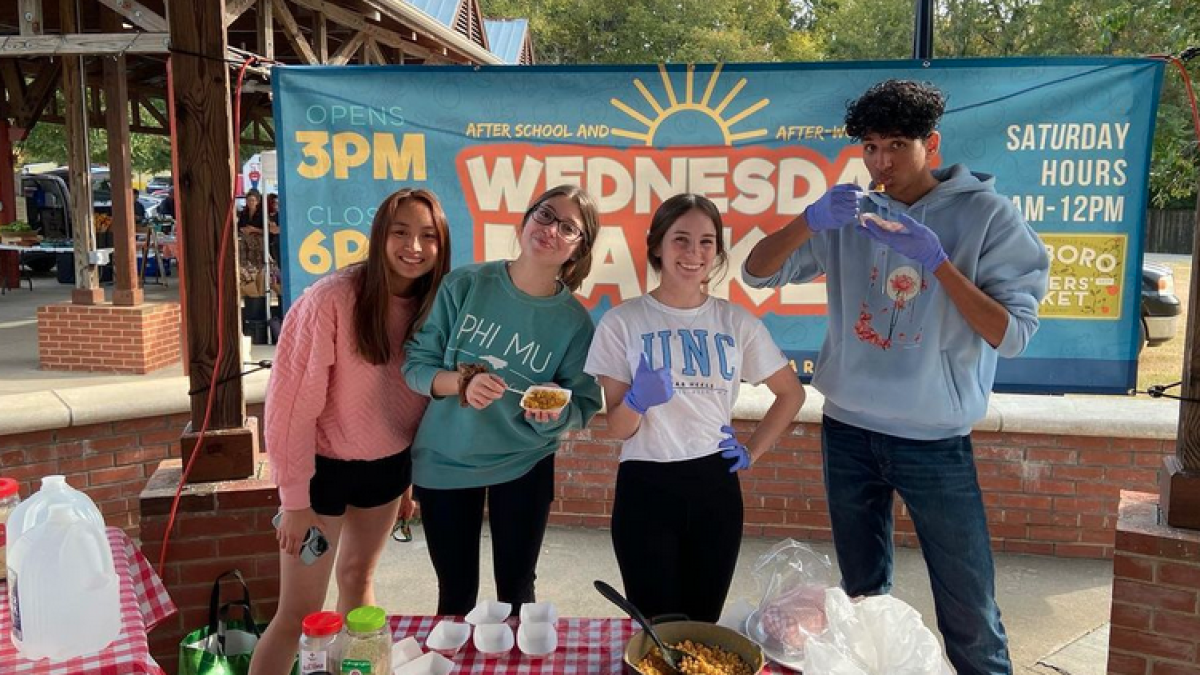Student group blends nutrition science and the art of cooking
The Tar Heels behind the Culinary Medicine Club are working to empower students and community members to embrace food as medicine through workshops, cooking sessions and recipes.

Good nutrition can make a world of difference in preventing health issues. The Tar Heels behind the Culinary Medicine Club are spreading that message by blending nutrition science and the art of cooking to empower students and community members to embrace food as medicine.
Created in the spring of 2021, the group of 100 students hosts workshops, dinners at the SECU Family House and cooking demonstrations on campus and local farmers markets in an effort to make nutrition more approachable while also providing people the tools to put the information into action for healthier lives.
“A lot of the time, you get advice about what you should eat, but what does that mean? How do I go about doing this? How do I buy that food? How do I cook that food?” said Serenity Bennett, a senior biology major and co-president of the group. “A lot of college students don’t know how to cook, so we try to merge all those activities. We try to make sure everyone knows the important skills – how to cook, how to feed themselves — and weave in those nutritious culinary medicine aspects.”
The idea for the club was spearheaded by Bennett, Bailey Benson and Maliha Bhuiyan, who have all come to the group from different experiences with food to spread the same message: food is medicine.
The science
Bennett was first drawn to the idea of culinary medicine while conducting research at the Goldring Center for Culinary Medicine in New Orleans. Throughout her summer internship, she led cooking demonstrations in the community while also developing curriculums and programs on food insecurity and medically tailored meals.
“I was seeing all the great impact that they were having in the New Orleans community from both an education standpoint and then also addressing food insecurity through demonstrations. I thought that would be a great thing to implement here in Chapel Hill,” said Bennett.
Bhuiyan, on the other hand, has had the approach of “food as medicine” in her life for as long as she can remember. Growing up in Bangladesh, the idea was woven into family tradition.
“Whenever someone would get sick, my great-grandmother and my grandmother would have specific meals that they would cook,” she said. “I knew that, aside from the medication, food also has a medicinal role in your body and promoting wellness.”
But she still saw the impacts of poor nutrition in the community around her.
“Nutrition education and public health programs related to nutrition education was not a thing,” said Bhuiyan, a nutrition science major at UNC Gillings School of Global Public Health who serves as co-president. “I saw a lot of my immediate family members, relatives, community members and neighbors suffering from preventable diseases that would not have happened if nutrition education was in our communities.”
Combining that experience with cardiovascular disease research, Bhuiyan felt motivated to share the approach with more people and help others prevent health problems through better eating.
Bennett and Bhuiyan lead the group’s science and education arm of the Culinary Medicine Club, sifting through research and developing initiatives — from guest speakers to demonstrations — to get that information out to the most people.
“We really try to talk about specific foods that can prevent specific diseases but also cater to personal well-being goals and health and wellness needs,” Bhuiyan said. “We try to make our initiatives evidence-based. We extensively research the background and present it in a conversational way to target our audience.”
That starts with using the science they’re learning, both in the classroom and in their own research, to create the basis of healthy meals, like squash macaroni and cheese.
The cooking
Benson, also a co-president, brings the art of cooking to the table, utilizing science to create healthy meals and then sharing them with the community at workshops or their stand at the Carrboro Farmers Market.
“My main goal when it comes to the club is to make sure everyone knows the culinary history, as well as getting the culinary education about the foods that we’re cooking, like where the vegetables come from and the anatomy of the vegetables,” she said. “Then we cook them in a way that really makes the ingredients shine and give the most value.”
To keep the healthy recipes approachable for college students living in dorms or community members struggling with food insecurity, Benson aims to keep the meals low-cook to no-cook options with minimal ingredients, making full kitchens or fancy appliances unnecessary to eat a healthy meal.
“That’s where the real challenge lies for me: creating these recipes that are healthy and affordable but don’t require a lot of ingredients or tools,” said Benson, a food studies major and business minor. “That’s the most satisfying and rewarding challenge there is: Making a recipe that anyone can make anywhere.”
Even if students can’t cook the recipes themselves in their dorms, Benson hopes they can take that education and use it to make healthier decisions while eating out.
Though the club is less than two years old, the group’s three leaders say they’ve been leaving a mark on the campus and surrounding community. They’re even in the early stages of working with the UNC School of Medicine to develop a culinary medicine course for undergraduates and medical students. They are also seeing their fellow Tar Heels making strides toward better nutrition.
“Not only do we see the effect that we have on our members, but we’re hearing about the things that our members are doing for their friends and what their friends are doing for their friends,” Benson said. “It’s a ripple effect. Every drop we can make in that bucket is incredibly important. What we do here really serves a purpose for Carolina.”




